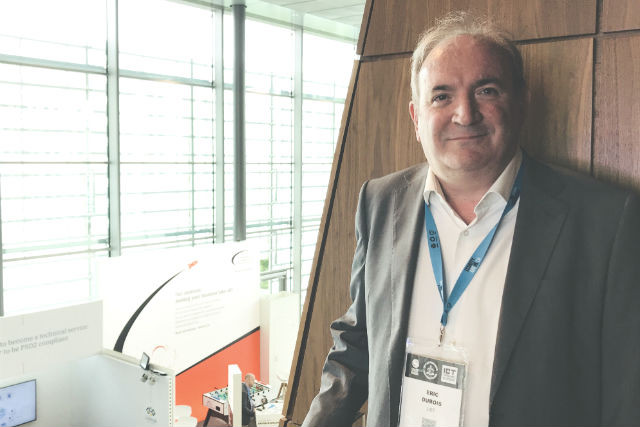Jessica Bauldry: How is List involved in embedding smart city concepts in Luxembourg?
Professor Dubois: List is a public establishment with the mission to innovate in terms of new products and services for the benefit of the private, public sectors and for citizens in general. Our mission is to transform scientific knowledge from research into the prototypes of new products and services and give added value for partners.
IT plays an important role in collecting data that circulates in a city, this data can be collected by humans exchanging information, we collect more and more through IoT [internet of things]. We collect data on buildings, the flow of vehicles on people, everything. The idea is to take this data and make a digital mirror of the town, or a “twin town” and use the data to develop new services.
The services here are closely linked with the governance of the town and they’re focused a lot on the citizen because they look at the quality of life of the citizen and their wellbeing in the town. We collect data, pull information and create services that make towns more efficient, help citizens and perhaps develop other services with a business vocation.
What concrete smart city projects is List working on?
We’re working with Fondation Enovos, to find out how to make the best use of our energy resources like photovoltaic and biomass, for instance, where to locate photovoltaics to get the most out of them.
We’re coordinating a European project called H2020 European Success project in Luxembourg, which is linked to the logistics in towns linked to construction. It was noted that a big issue for congestion in towns was linked to construction and lorries passing back and forth. We worked with 4 towns in Europe, including Luxembourg where, while working with Tralux, we studied the impact of the roadworks on traffic and we tried to formulate recommendations, for instance by creating consolidation centres.
Another European project, Mobility Urban Values, is linked to car mobility and aims to encourage transport shifts for different circumstances, to get people to car share, go from car to bus, or train etc. The objective is to raise awareness and encourage people to change their behaviour. We’ve created a gameification with incentives around the concept so people are encouraged to participate and win. We’ve done 4 pilots, recently Dudelange commune has joined the pilot.
The last project, H2020 Crosscult, targets citizens or visitors of a town and aims to exploit the cultural wealth of a town in relation to its visitors using innovative ICT technologies. The idea is to recommend, match people based on their profiles, what do they recommend in terms of visits, walking in the town for example. Something we’ve added is to create a community around topics, for example if people like place d’Armes, they can exchange with other people who like it and exchange and add information to enrich the tool. In Luxembourg, Luxembourg City and Belval are pilot towns.
What challenges do you face in implementing smart city practices?
The challenges depend on the different services. When banks are the beneficiaries, the value is clearly established, the banks get value from this service. For smart cities it’s more complicated. The beneficiary is the community, the citizen. Therefore, we may have the IT infrastructure put in place to collect data, but a commerical partner then has to find a business model afterwards to determine things like who will pay for the service? Will it be the commune which subscribes to a set of services which citizens benefit from? Will private companies use it to commercialise services by including citizens? The business model and how it is managed is an important question.
What is a smart city?
“A smart sustainable city is an innovative city that uses information and communication technologies (ICTs) and other means to improve quality of life, efficiency of urban operations and services, and competitiveness, while ensuring that it meets the needs of present and future generations with respect to economic, social and environmental aspects.” From: ITU-T focus group on smart sustainable cities.
